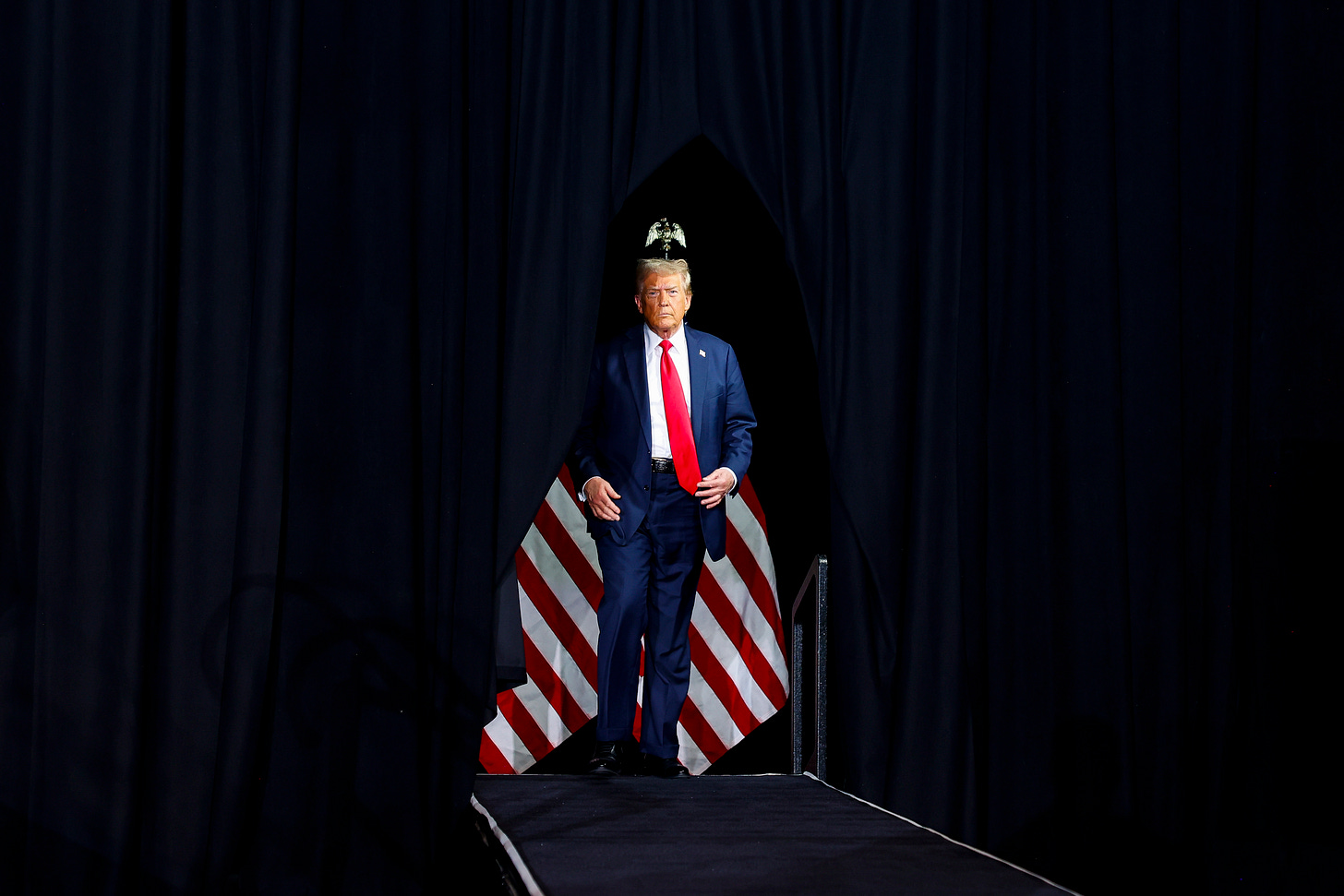Trump’s Descent
He’s grown increasingly open with talk of violence. His supporters don’t mind.

IT’S EASY TO GRASP WHY there was plenty of coverage of Donald Trump’s bizarre episode last night—in which he gently swayed to music for 39 minutes on stage in Pennsylvania, raising new questions about his mental health. Even so, that version of Trump, pumping his arms arhythmically to Pavarotti, the Village People, and the rest of his playlist reliables, was preferable to the Trump who showed up over the weekend, when he repeatedly floated the idea of using military force against his political opponents.
Unfortunately, Trump’s darkening vision doesn’t seem to be bothering approximately half of America. With the race as tight as it is, there’s an even chance that the morning after Election Day we’ll be waking up to his world of venom, vengeance, and violence.
The combination of Trump’s increasingly incendiary messaging and so many Americans accepting it as normal may explain why Vice President Kamala Harris says she and Tim Walz are underdogs. The prospect of Trump becoming president should be scaring the shadberries out of us.
That Trump is blasting out ever darker messages as November 5 approaches defies logic and conventional campaign wisdom. Perhaps, just as George Conway warns, he is just the same old malignant narcissist, now decompensating under the pressure of a looming election where his own liberty is at stake.
But while Trump may simply be grappling with his own mental chaos, his let-it-rip approach serves four other purposes:
He can motivate low-propensity voters with his willingness to stand up for, and even use violence in defense of, their identity. In this sense, Trump’s authoritarian inclination, as Bill Kristol noted yesterday, is less of a vulnerability than a selling point.
He can try and demoralize anyone who believes in a constitutional republic.
He can prepare us for something closer to one-man rule if he wins.
He can prop up his Plan B, part of which involves inciting his most extreme followers to take violent action to fight his loss.
Those appeared to be some of his motives over the last few days, as Trump, a convicted felon, made his increasingly menacing remarks.
First, last Thursday he said that networks which air news programs he disapproves of should have their broadcast licenses revoked.
Then, in his rally on Friday in Aurora, Colorado, Trump (as an NBC headline put it) “escalate[d] his rhetoric on outlawing political dissent and criticism”—lying about Harris, the press, and Google, and promising retribution for actions he falsely called “illegal.” He also falsely claimed that Aurora is a “war zone”—language that softens up listeners for the possibility of the use of military force on American soil.
Which is what Trump then explicitly discussed on Sunday in an interview with Fox’s Maria Bartiromo. Calling Democrats “the enemy from within,” he said they are worse than our foreign adversaries like Russia and China, and he threatened to use the armed forces against American citizens who oppose him:
I think the bigger problem is the enemy from within. Not even the people that have come in and destroying our country. . . . I think the bigger problem are the people from within, we have some very bad people, we have some sick people, radical-left lunatics. . . . And it should be easily handled by, if necessary, by National Guard, or if really necessary, by the military.
Mark Esper, who served as secretary of defense in 2019 and 2020, was asked on CNN last night about Trump’s interview with Bartiromo: “Yes,” Esper said, “I think we should take those words seriously.” Esper has reason to know; in his memoir, he recounts how Trump asked him in June 2020 about having troops fire on protestors: “Can’t you just shoot them in the legs or something?”
Sandwiched between the Aurora speech and the Fox interview, Trump raged during a rally in California that a young woman who heckled him should “get the hell knocked out of her.” That’s how dictators signal their brownshirts to do their dirty work for them.
IF YOU’RE WONDERING HOW, with all this, Trump is a coin-flip chance away from being back in the White House, then indulge this personal story. Over the past weekend, a visitor from Palm Desert, California told me she didn’t like either candidate and couldn’t wait until 2028. Dumb me, I suggested that if Trump becomes president, there would be no election in 2028.
“What,” she asked in a tone of ridicule, “you think we’ll have a dictatorship?” When I nodded, her smirk was less than endearing.
She obviously wasn’t attuned to Trump’s bonkers statements about kicking dissenting broadcasters off the air, about jailing opponents, and about creating a one-party state—let alone using the military against opponents. A decade ago, any one of those threats would have marked the end of a presidential candidate’s campaign. Now, in a country where he’s desensitized so many to his authoritarianism, the prospect of having a totalitarian president earns smirks.
Perhaps there’s hope in the fact that important people with national platforms are sounding loud alarms. Bob Woodward’s new book, War, reportedly reveals that retired Gen. Mark Milley, the chairman of the Joint Chiefs of Staff during Trump’s last year and Biden’s first, warned that Trump is “fascist to the core.” The general added that Trump is the “most dangerous person in the country.”
Liz Cheney, when asked about Milley’s statement by Meet the Press host Kristen Welker, said with compelling understatement: “I have no reason to disagree.”
These are not hotheads. The nation’s previous highest-ranking military officer is, to state the obvious, an accomplished and serious man. Likewise, Cheney—formerly the chair of the House Republican Conference—is an accomplished and serious woman. Trump isn’t hiding his intentions. Attention must be paid.



